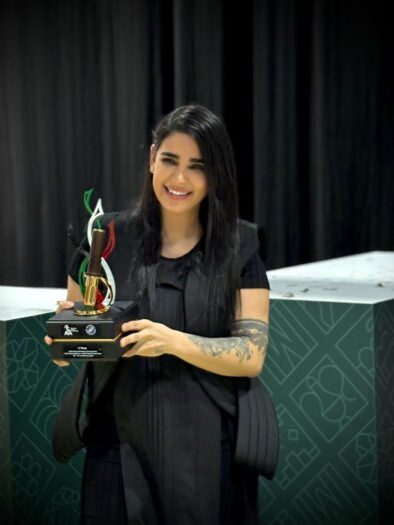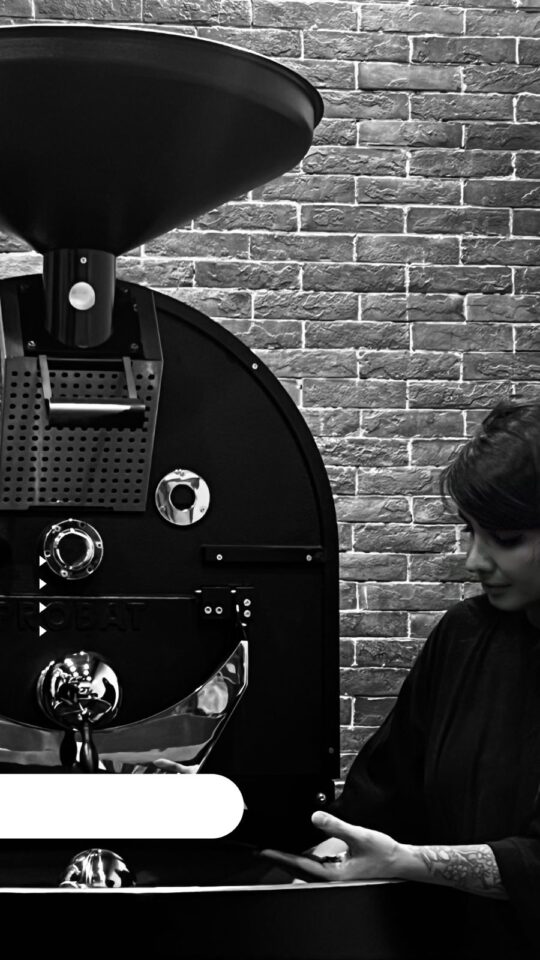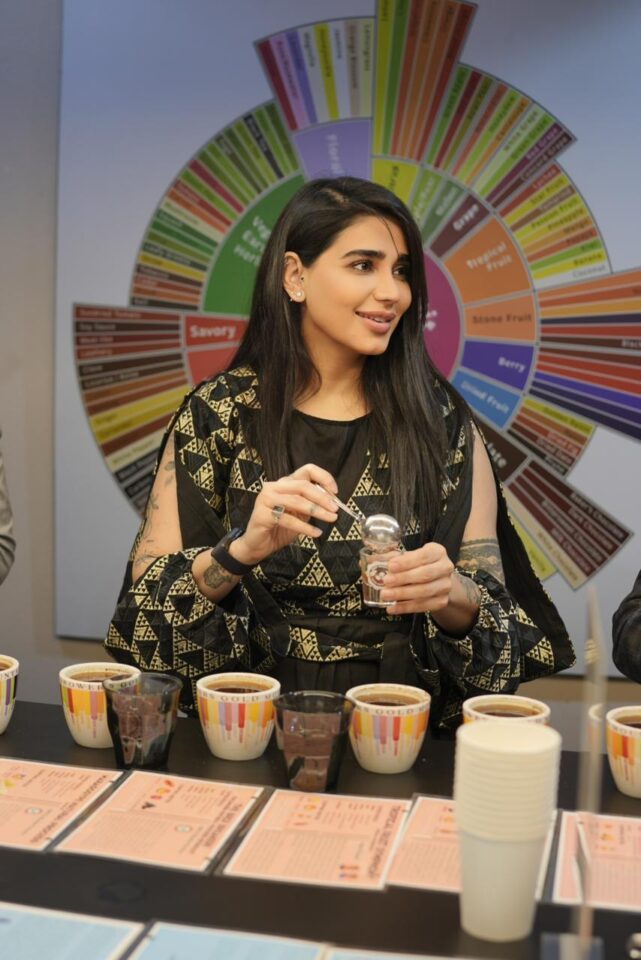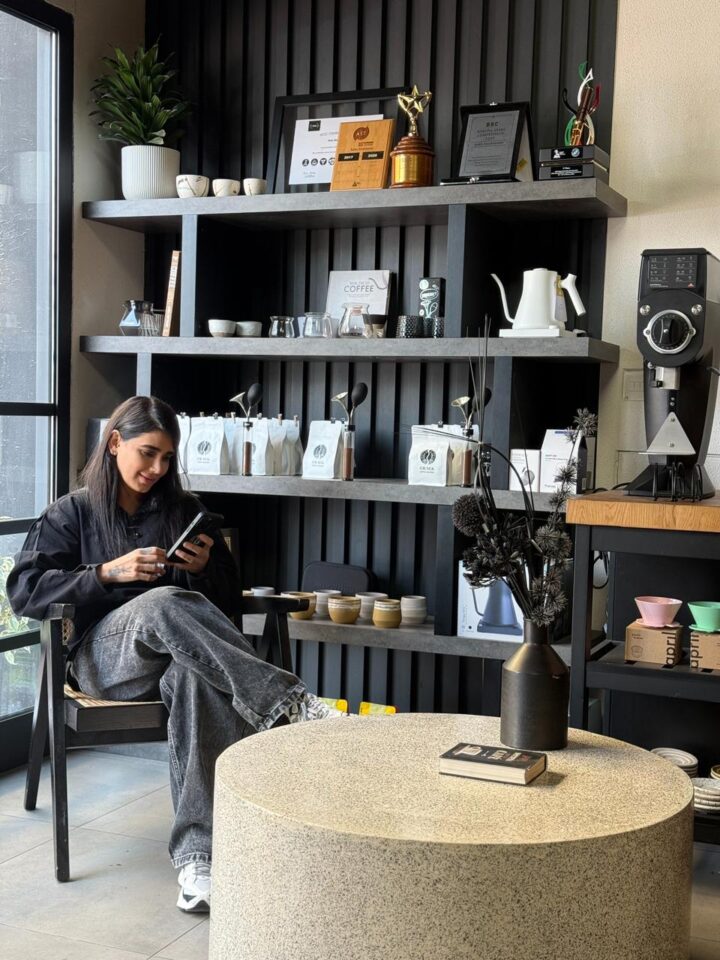Dubai – Ali Al-Zakary
Between the tongues of flame and the warmth of glowing beans, the story of Raha Shahsavar was born — a young woman who redefined roasting as an art that balances science and intuition. Her journey began in Iran with a childlike fascination for aromas, heat, and wonder, but it was in the UAE that her talent found a home. There, she refined her passion through study and practice until she became the UAE National Coffee Roasting Champion 2025.
Her path is more than a tale of professional success — it is a saga of passion and perseverance, showing how a dream can ignite into a flame of creativity when guided by responsibility and love for the craft. Between Raha the artist, who paints with color and shadow, and Raha the roaster, who paints with aroma and flavor, stands a woman who turned the “first crack” into a symbol of transformation and creation.
In this inspiring conversation, Raha opens the pages of her journey — from her humble beginnings at the Coffee Museum to founding Crack Coffee Roastery, from her early experiments with fire and flavor to winning the highest title in the UAE roasting scene.
Join us as we discover the story of Raha Shahsavar — her passion, philosophy, and vision for the role of women in specialty coffee.
What inspired you to enter the world of coffee? Did your journey begin in Iran or in the UAE?
My journey with coffee started in Iran, where I first became fascinated by the sensory world behind it , the aromas, the science, and the emotions it evokes. But it truly flourished in the UAE, where I found the opportunity and freedom to turn that curiosity into a career.
What were the first steps you took in roasting? Did you face any technical or cultural challenges at the start?
In the beginning, I had very limited access to proper roasting equipment or mentors, so I learned by observing, experimenting, and failing a lot. I started with a small sample roaster in coffee Museum and slowly built my understanding of heat transfer, bean behavior, and sensory calibration. The biggest challenge wasn’t just technical ,it was cultural. As a woman entering a very male-dominated part of the coffee industry, I had to prove my knowledge and precision. It took persistence, humility, and constant learning.
Who has been your biggest supporter throughout your professional journey?
I’ve been lucky to have supportive family and partner who was always there for me and friends in the coffee community , people who believed in my potential before I even did.
What’s the story behind founding Crack Coffee Roastery? And why did you choose that name?
Crack Coffee Roastery was born out of both passion and necessity. I wanted a space where I could roast freely, teach, experiment, and express the art of coffee without limitation. The name “Crack” comes from the first crack in roasting, it symbolizes both change and creation: the moment when something ordinary becomes extraordinary.
How do you translate your passion for coffee into a final product that reaches the customer?
I try to make sure that every coffee we release has a soul that it represents the farmer’s effort, the origin’s character, and my own interpretation of flavor. I spend a lot of time on sensory evaluation and consistency, but also on presentation, because how people see and feel a coffee is part of the experience. Whether it’s a café supply, a course, or a single retail bag, I want customers to sense that care in every detail.
What is your philosophy when it comes to roasting? Do you follow a specific approach to bring out flavor profiles?
My philosophy is balance between data and intuition, control and creativity. I rely on sensory feedback, but I also respect the chemistry of roasting. Every origin and process needs a different dialogue with heat. I like to roast transparently, keeping the coffee’s identity intact rather than forcing a style. My goal is always to reveal the bean’s potential, not to hide it under roast character.
How did it feel to win the title of UAE National Roasting Champion 2025? How did you prepare for the competition?
It was an emotional moment not only because of the title but because it validated years of hard work at the roastery. I prepared intensely, specially last 2 weeks, studying the rules and regulations , recalibrating my skills, and pushing myself to perform under pressure also roasting every day.
Winning was never about beating others it was about proving to myself that passion and persistence can truly change your path. It was also a proud moment for women in coffee, showing that our voices and craftsmanship belong on that stage.
How have your certifications, such as Q Arabica Grader and Q Processing, shaped your skills?
They’ve been transformative. The Q system taught me to evaluate coffee objectively and communicate flavor precisely. Q Processing expanded my understanding of how post harvest methods shape cup quality something I now apply to every sourcing and roasting decision. And as an AST, I’ve learned that teaching others is one of the best ways to deepen your own understanding. And every time I’m learning something new.
As a judge in World Coffee Competitions, what are the key criteria you focus on during evaluations?
Consistency, clarity, and emotional impact. Of course, we have technical protocols and sensory standards, but beyond the score sheets, I always look for intent the competitor’s story, and whether their cup or performance truly communicates something meaningful. It’s not just about perfection; it’s about connection.
Do you still practice visual art? And do you see a connection between artistic sensibility and your work in coffee?
Yes, art has always been part of me. I still paint, sketch, and design and I see roasting as another form of art. Both require observation, patience, and sensitivity to balance. My artistic side helps me visualize flavor and emotion; it’s what guides me when I create concept based blends. Coffee, for me, is where science and art meet.
How would you describe the role of women in the specialty coffee scene—whether in Iran or the UAE?
Women have always been present, but often not visible. In both Iran and the UAE, more women are now entering roasting, judging, and business and they’re doing it with strength We bring empathy, creativity, and resilience to this industry. The more we support each other, the faster the culture evolves beyond old stereotypes.
What advice would you give to women who aspire to enter the world of coffee, whether in roasting, judging, or entrepreneurship?
Don’t wait for permission. Learn, fail, try again and never let anyone make you feel that you need to “prove” your value. Build your knowledge, trust your palate, and be consistent. The coffee world can be tough, but it rewards authenticity and passion.
Your favorite brew method: filter or espresso?
Filter coffee . But I enjoy espresso also.
A roastery you admire globally?
Phoenix Roastery in the U.S. I admire their approach to experimentation and their respect for craftsmanship.
A coffee farm you dream of visiting one day?
Finca Deborah in Panama — their innovation in processing and sensory development is fascinating. I’d love to experience that environment firsthand.
The strangest flavor you’ve ever discovered in a cup?
A Liberica from Malaysia honey process. It had this wild combination of jackfruit, rose syrup, and ferment-like sweetness that felt completely outside the normal arabica spectrum. It reminded me how endless coffee flavor can be.
The post Raha Shahsavar: From the First Crack of the Bean to the Peak of Roasting in the UAE appeared first on Qahwa World.







